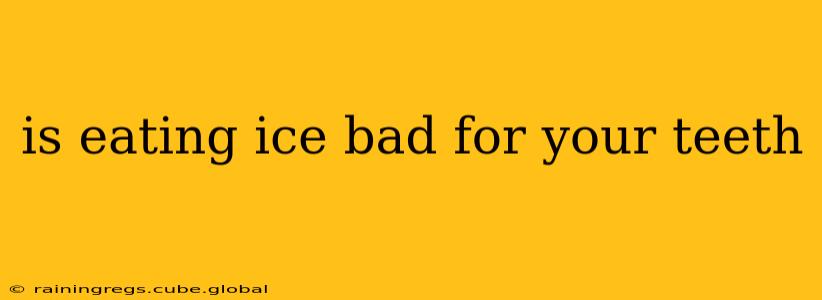Is Eating Ice Bad for Your Teeth? A Chilling Truth
Many of us enjoy the refreshing crunch of ice, especially on a hot day. But is this seemingly harmless habit actually damaging to our teeth? The short answer is: yes, it can be. While the occasional ice cube won't likely cause significant harm, regularly consuming ice can lead to several dental problems. Let's delve into the details.
How Does Eating Ice Damage Teeth?
The primary culprit is the extreme hardness of ice. When you bite down on ice, the force applied can cause a variety of issues:
-
Cracked or chipped teeth: Ice is significantly harder than tooth enamel, the protective outer layer of your teeth. This hardness disparity means that the force of your bite can fracture or chip your enamel, leaving your teeth vulnerable to decay and sensitivity.
-
Fractured fillings or crowns: If you have existing dental work like fillings or crowns, the pressure from chewing ice can compromise their integrity, leading to further damage or even loss of the restoration.
-
Increased tooth sensitivity: Chipping or cracking the enamel exposes the dentin, the softer layer beneath. This exposure makes your teeth more sensitive to temperature changes, sweet, sour, and acidic foods and drinks.
-
Worn-down enamel: Consistent chewing on ice leads to gradual enamel erosion. This is a cumulative effect, where small amounts of wear over time can significantly impact your dental health. Thinned enamel increases susceptibility to cavities and other dental problems.
What are the Long-Term Effects of Eating Ice?
The long-term consequences of habitually chewing ice can be quite significant. Persistent enamel erosion makes your teeth more vulnerable to cavities and decay. This can lead to the need for extensive dental work, including fillings, crowns, root canals, or even tooth extraction in severe cases. Furthermore, the increased tooth sensitivity can become quite bothersome, impacting your ability to enjoy hot and cold foods and drinks.
Is it okay to eat ice occasionally?
The occasional indulgence is unlikely to cause substantial damage. However, it’s crucial to be mindful of your habits. The key is moderation.
What are the alternatives to eating ice for a cooling sensation?
There are plenty of healthier alternatives to satisfy that need for a cool treat:
-
Frozen fruit: Fruits like grapes, berries, and bananas can be frozen for a refreshing and nutritious alternative to ice.
-
Ice pops: Many commercially available ice pops offer a flavorful and less damaging option. Opt for low-sugar varieties for optimal dental health.
-
Cold drinks: A chilled glass of water or other beverages can offer a cooling effect without the risk of dental damage.
When should I see a dentist about ice chewing habits?
If you notice any signs of chipped or cracked teeth, increased tooth sensitivity, or discomfort when chewing, it's essential to consult your dentist promptly. Early intervention can prevent further complications.
Can chewing ice cause other health problems besides dental issues?
While dental issues are the most prominent concern, some people may experience jaw pain or temporomandibular joint (TMJ) disorders due to the forceful chewing action. However, this is not as direct a consequence as the dental problems discussed above.
By understanding the potential risks associated with ice chewing and adopting healthier alternatives, you can protect your teeth and maintain optimal oral health. Remember, moderation is key, and if you have concerns, consulting your dentist is always recommended.
